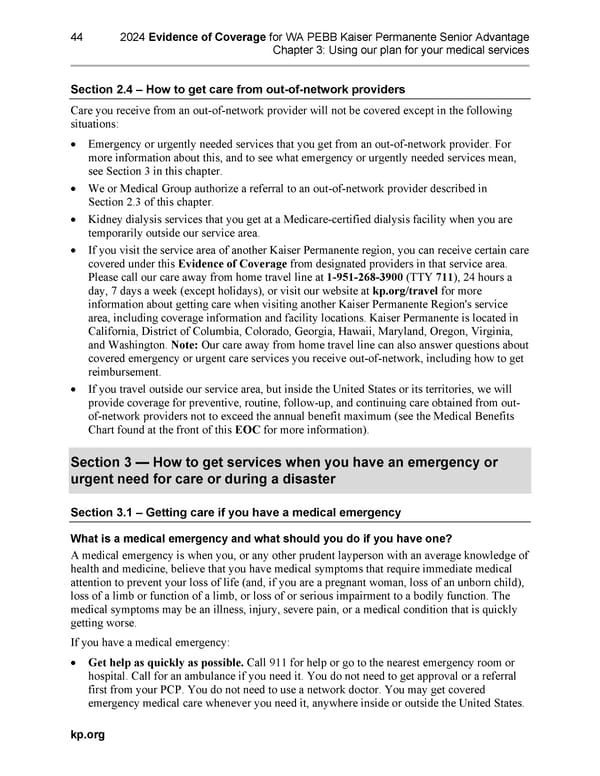44 2024 Evidence of Coverage for WA PEBB Kaiser Permanente Senior Advantage Chapter 3: Using our plan for your medical services Section 2.4 – How to get care from out-of-network providers Care you receive from an out-of-network provider will not be covered except in the following situations: • Emergency or urgently needed services that you get from an out-of-network provider. For more information about this, and to see what emergency or urgently needed services mean, see Section 3 in this chapter. • We or Medical Group authorize a referral to an out-of-network provider described in Section 2.3 of this chapter. • Kidney dialysis services that you get at a Medicare-certified dialysis facility when you are temporarily outside our service area. • If you visit the service area of another Kaiser Permanente region, you can receive certain care covered under this Evidence of Coverage from designated providers in that service area. Please call our care away from home travel line at 1-951-268-3900 (TTY 711), 24 hours a day, 7 days a week (except holidays), or visit our website at kp.org/travel for more information about getting care when visiting another Kaiser Permanente Region's service area, including coverage information and facility locations. Kaiser Permanente is located in California, District of Columbia, Colorado, Georgia, Hawaii, Maryland, Oregon, Virginia, and Washington. Note: Our care away from home travel line can also answer questions about covered emergency or urgent care services you receive out-of-network, including how to get reimbursement. • If you travel outside our service area, but inside the United States or its territories, we will provide coverage for preventive, routine, follow-up, and continuing care obtained from out- of-network providers not to exceed the annual benefit maximum (see the Medical Benefits Chart found at the front of this EOC for more information). Section 3 — How to get services when you have an emergency or urgent need for care or during a disaster Section 3.1 – Getting care if you have a medical emergency What is a medical emergency and what should you do if you have one? A medical emergency is when you, or any other prudent layperson with an average knowledge of health and medicine, believe that you have medical symptoms that require immediate medical attention to prevent your loss of life (and, if you are a pregnant woman, loss of an unborn child), loss of a limb or function of a limb, or loss of or serious impairment to a bodily function. The medical symptoms may be an illness, injury, severe pain, or a medical condition that is quickly getting worse. If you have a medical emergency: • Get help as quickly as possible. Call 911 for help or go to the nearest emergency room or hospital. Call for an ambulance if you need it. You do not need to get approval or a referral first from your PCP. You do not need to use a network doctor. You may get covered emergency medical care whenever you need it, anywhere inside or outside the United States. kp.org
 Kaiser Permanente NW Senior Advantage EOC (2024) Page 81 Page 83
Kaiser Permanente NW Senior Advantage EOC (2024) Page 81 Page 83